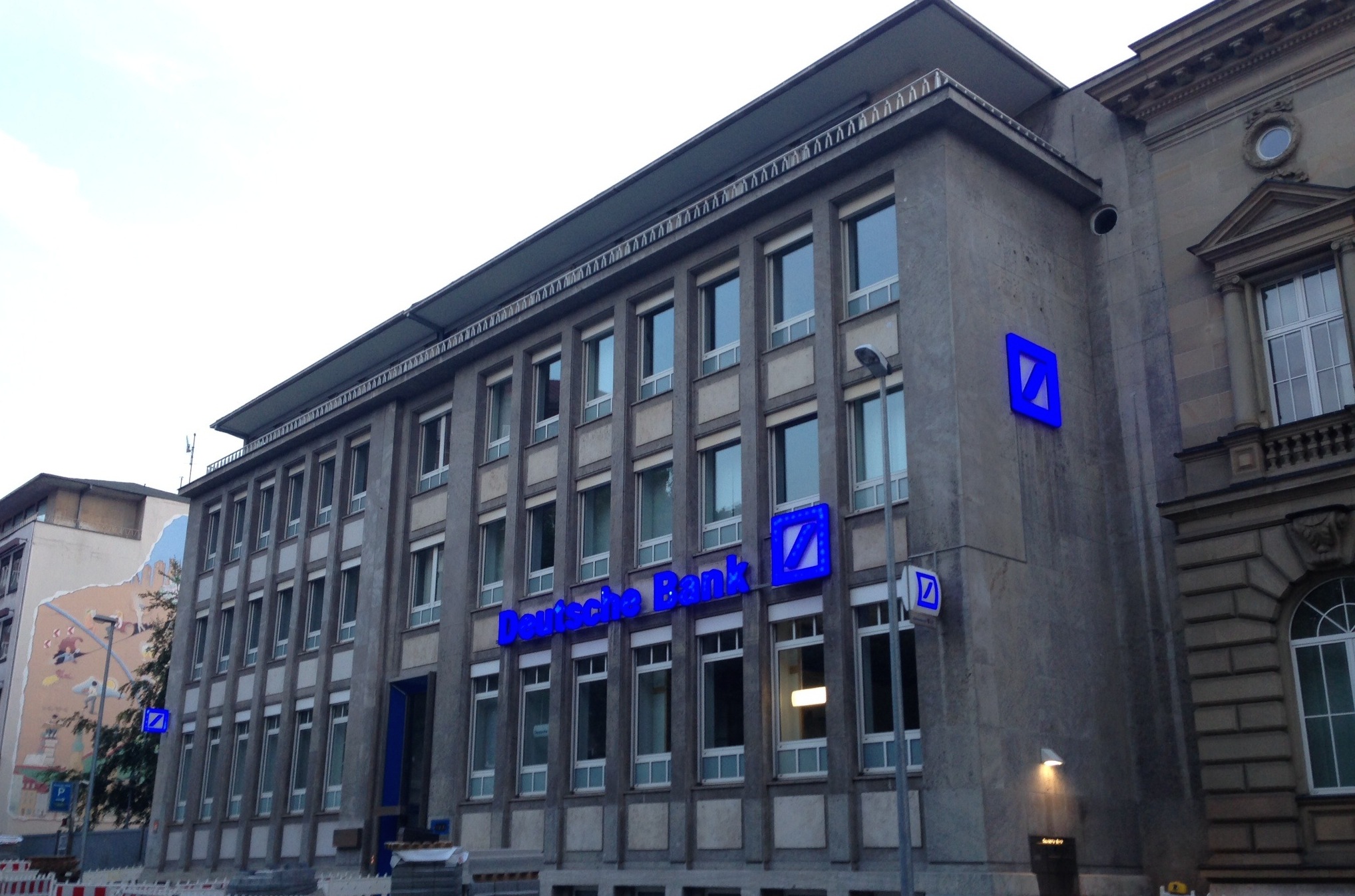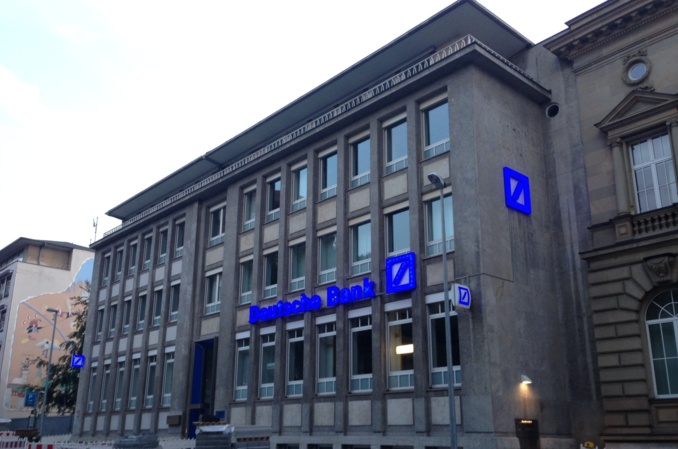In late June, the International Monetary Fund (IMF) has called Deutsche Bank, still reeling from the effects of the global financial crisis of 2008, the most serious source of risk amid global systemically important banks (GSIBs). At the same time, the Federal Reserve (Fed) reported that the US subsidiary of the bank failed a stress test due to poor risk management and financial planning. The Fed tested 33 banks in total; of them, only two - Deutsche Bank and Spanish Santander – failed the examination.
Such unflattering news made shares of Deutsche Bank fall to 30-year low, to € 12.37 per share. Meanwhile, experts started to talk about the fact that Germany's biggest bank may repeat fate of US investment bank Lehman Brothers, which bankruptcy kick started the global financial crisis in 2008.
The German financial sector plays a key role in the global economy. German asset management market, according to the IMF, is the third largest in the European Union. At the same time, the sovereign bond market is a haven for investment and global benchmark of cost for fixed-income instruments. Germany is a homeland for two of the 30 global systemically important banks (as the Financial Stability Board estimates) - Deutsche Bank AG and Allianz SE. Above that, there are one of the world's largest exchanges for trading in financial derivatives (Eurex Clearing AG), and many small banks and insurance companies.
Deutsche Bank is closely linked to other publicly traded banks and insurance companies of the country. Therefore, it can become a source of their financial exposure. Deutsche Bank’s investment banking division is one of the largest in the world, it can be compared only to same departments in Bank of America, Merrill Lynch, JP Morgan Chase, Citigroup and Goldman Sachs.
The worsening situation in the German banking system is most likely to trigger a chain reaction and the world’s banking crisis. At that, damage for the German banking system will be less than that for the world, the IMF fears. "Germany, France, the US and the UK are the greatest risks of external side effects, which are measured as a percentage of capital losses in other banking systems due banking shocks in these countries," - the bank’s report.
In 2009, CEO of Deutsche Bank Josef Ackermann argued that the bank had enough money to survive the crisis. However, in 2012, several of his former colleagues said that the bank factually hid € 12 billion in losses from derivatives. In particular, Deutsche Bank understated assessment on derivatives on the the highest rated assets, bought with help of borrowed funds. Nominal volume of this position amounted to about $ 130 billion. If it had been recorded correctly, the bank’s capital indicators would have fallen to critical levels during the crisis. Then, the bank would not have to ask for the state’s help. Traders deliberately avoided revaluation of contracts in accordance with market prices, thus avoiding loss of balance due to unprecedented turmoil in the credit markets in 2007-2009. Otherwise, losses for the entire portfolio could reach $ 12 billion.
Bankruptcy of Deutsche Bank first loomed on the horizon in 2013, when the bank admitted the need of additional capital. In 2013, the institution raised $ 3 billion through issuance of shares for the bank’s shareholders. Co-director of Deutsche Bank Anshu Jain claimed that it is enough and "the starvation is over". In April 2014, however, the bank attracted new € 1,5 billion, and a month later suddenly announced sale of the shares for a total of € 8 billion, with a discount of 30% to the current value.
In March 2015, results of the stress tests showed that the bank needs capital again. During the crisis, the bank earned some money, mainly due to the manipulation of LIBOR rate, for which he was fined $ 2.5 billion in April 2015. This scandal made Jain and his colleague Jürgen Fitschen resign. At the same time, S&P rating agency downgraded credit rating of Deutsche Bank from A to BBB +. This is only three notches above "junk".
At the beginning of June 2016, Deutsche Bank once again found at the center of controversy because of the machinations with LIBOR rates. The United States charged two former traders of the bank, while the British Financial Services Authority reported that at least 29 employees of the bank, worked in London, Frankfurt, Tokyo and New York, had fingers in the pie.
Last year, Deutsche Bank reported a net loss to € 6.8 bln. for the first time since 2008. The losses were caused by decline in value of investment and retail banking units, as well as high court expenses (in 2015, the latter amounted to € 5,2 billion). Revenue was $ 33.5 billion, which is almost nothing for such a big institution.
In recent years, the bank was trying to restructure its work. In October 2015, new co-director John Cryan launched a large-scale restructuring, which included staff reductions and reorganization of operations, but it has not given significant results yet. Financial results for the first quarter of 2016 only prove this. The bank completed the year with profit (€ 236 million), but it decreased by 58% with respect to last year.
Since the beginning of the year Deutsche Bank’s quotes fell by 50% amid investors’ fears about a possible lack of liquidity. The bank’s capitalization as of July 15 amounted to only € 18 billion. Own capital is estimated at only $ 60 billion, while the nominal value of the risk of involvement in derivative transactions [by the end of April] - $ 72.8 trillion, which is more than 20 times higher than the GDP of Germany in 2015 ($ 3.4 trillion). As pointed out by The Street, Deutsche Bank accounts for 13% of the total volume of derivatives, which amounted to € 550 trillion in 2015. This does not mean that Deutsche Bank will face a default on trillions of dollars, since most of the contracts held by counterparties, says The Street. However, the chain reaction can start in case of counterparty bankruptcy. "We have already seen how it can take over the world" - the edition thinks back of the 2008 crisis.
source: thestreet.com
Such unflattering news made shares of Deutsche Bank fall to 30-year low, to € 12.37 per share. Meanwhile, experts started to talk about the fact that Germany's biggest bank may repeat fate of US investment bank Lehman Brothers, which bankruptcy kick started the global financial crisis in 2008.
The German financial sector plays a key role in the global economy. German asset management market, according to the IMF, is the third largest in the European Union. At the same time, the sovereign bond market is a haven for investment and global benchmark of cost for fixed-income instruments. Germany is a homeland for two of the 30 global systemically important banks (as the Financial Stability Board estimates) - Deutsche Bank AG and Allianz SE. Above that, there are one of the world's largest exchanges for trading in financial derivatives (Eurex Clearing AG), and many small banks and insurance companies.
Deutsche Bank is closely linked to other publicly traded banks and insurance companies of the country. Therefore, it can become a source of their financial exposure. Deutsche Bank’s investment banking division is one of the largest in the world, it can be compared only to same departments in Bank of America, Merrill Lynch, JP Morgan Chase, Citigroup and Goldman Sachs.
The worsening situation in the German banking system is most likely to trigger a chain reaction and the world’s banking crisis. At that, damage for the German banking system will be less than that for the world, the IMF fears. "Germany, France, the US and the UK are the greatest risks of external side effects, which are measured as a percentage of capital losses in other banking systems due banking shocks in these countries," - the bank’s report.
In 2009, CEO of Deutsche Bank Josef Ackermann argued that the bank had enough money to survive the crisis. However, in 2012, several of his former colleagues said that the bank factually hid € 12 billion in losses from derivatives. In particular, Deutsche Bank understated assessment on derivatives on the the highest rated assets, bought with help of borrowed funds. Nominal volume of this position amounted to about $ 130 billion. If it had been recorded correctly, the bank’s capital indicators would have fallen to critical levels during the crisis. Then, the bank would not have to ask for the state’s help. Traders deliberately avoided revaluation of contracts in accordance with market prices, thus avoiding loss of balance due to unprecedented turmoil in the credit markets in 2007-2009. Otherwise, losses for the entire portfolio could reach $ 12 billion.
Bankruptcy of Deutsche Bank first loomed on the horizon in 2013, when the bank admitted the need of additional capital. In 2013, the institution raised $ 3 billion through issuance of shares for the bank’s shareholders. Co-director of Deutsche Bank Anshu Jain claimed that it is enough and "the starvation is over". In April 2014, however, the bank attracted new € 1,5 billion, and a month later suddenly announced sale of the shares for a total of € 8 billion, with a discount of 30% to the current value.
In March 2015, results of the stress tests showed that the bank needs capital again. During the crisis, the bank earned some money, mainly due to the manipulation of LIBOR rate, for which he was fined $ 2.5 billion in April 2015. This scandal made Jain and his colleague Jürgen Fitschen resign. At the same time, S&P rating agency downgraded credit rating of Deutsche Bank from A to BBB +. This is only three notches above "junk".
At the beginning of June 2016, Deutsche Bank once again found at the center of controversy because of the machinations with LIBOR rates. The United States charged two former traders of the bank, while the British Financial Services Authority reported that at least 29 employees of the bank, worked in London, Frankfurt, Tokyo and New York, had fingers in the pie.
Last year, Deutsche Bank reported a net loss to € 6.8 bln. for the first time since 2008. The losses were caused by decline in value of investment and retail banking units, as well as high court expenses (in 2015, the latter amounted to € 5,2 billion). Revenue was $ 33.5 billion, which is almost nothing for such a big institution.
In recent years, the bank was trying to restructure its work. In October 2015, new co-director John Cryan launched a large-scale restructuring, which included staff reductions and reorganization of operations, but it has not given significant results yet. Financial results for the first quarter of 2016 only prove this. The bank completed the year with profit (€ 236 million), but it decreased by 58% with respect to last year.
Since the beginning of the year Deutsche Bank’s quotes fell by 50% amid investors’ fears about a possible lack of liquidity. The bank’s capitalization as of July 15 amounted to only € 18 billion. Own capital is estimated at only $ 60 billion, while the nominal value of the risk of involvement in derivative transactions [by the end of April] - $ 72.8 trillion, which is more than 20 times higher than the GDP of Germany in 2015 ($ 3.4 trillion). As pointed out by The Street, Deutsche Bank accounts for 13% of the total volume of derivatives, which amounted to € 550 trillion in 2015. This does not mean that Deutsche Bank will face a default on trillions of dollars, since most of the contracts held by counterparties, says The Street. However, the chain reaction can start in case of counterparty bankruptcy. "We have already seen how it can take over the world" - the edition thinks back of the 2008 crisis.
source: thestreet.com



















